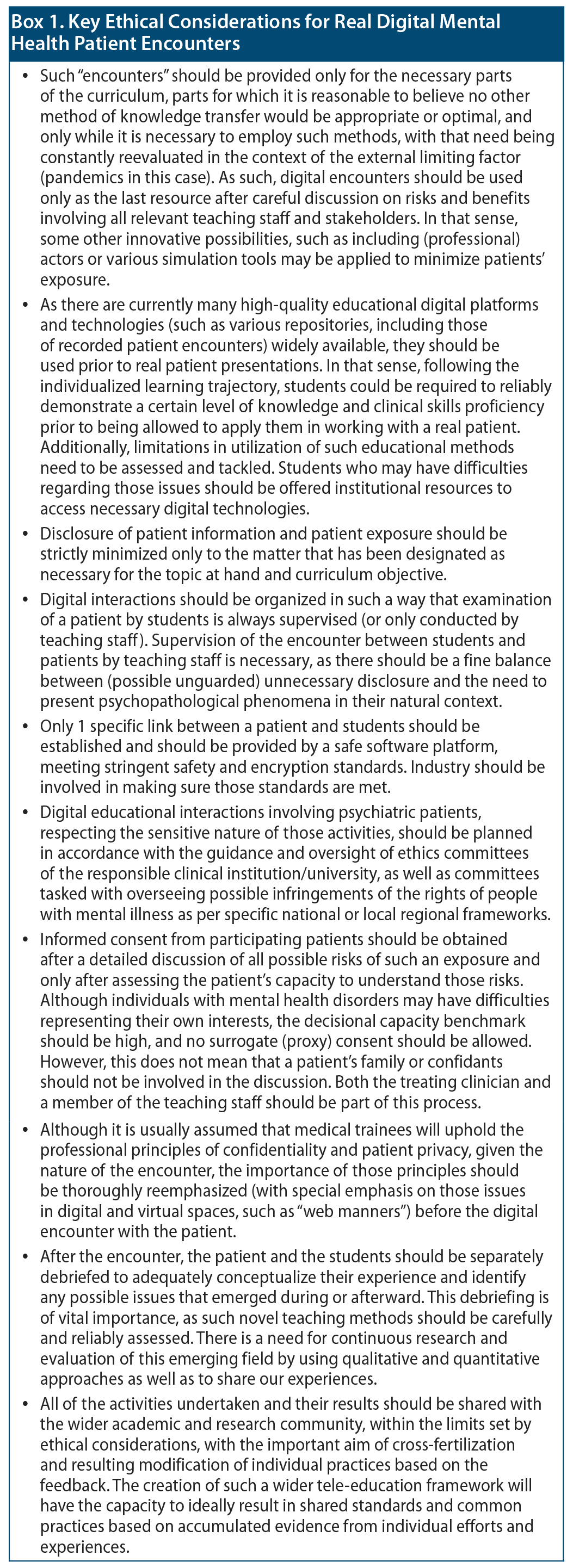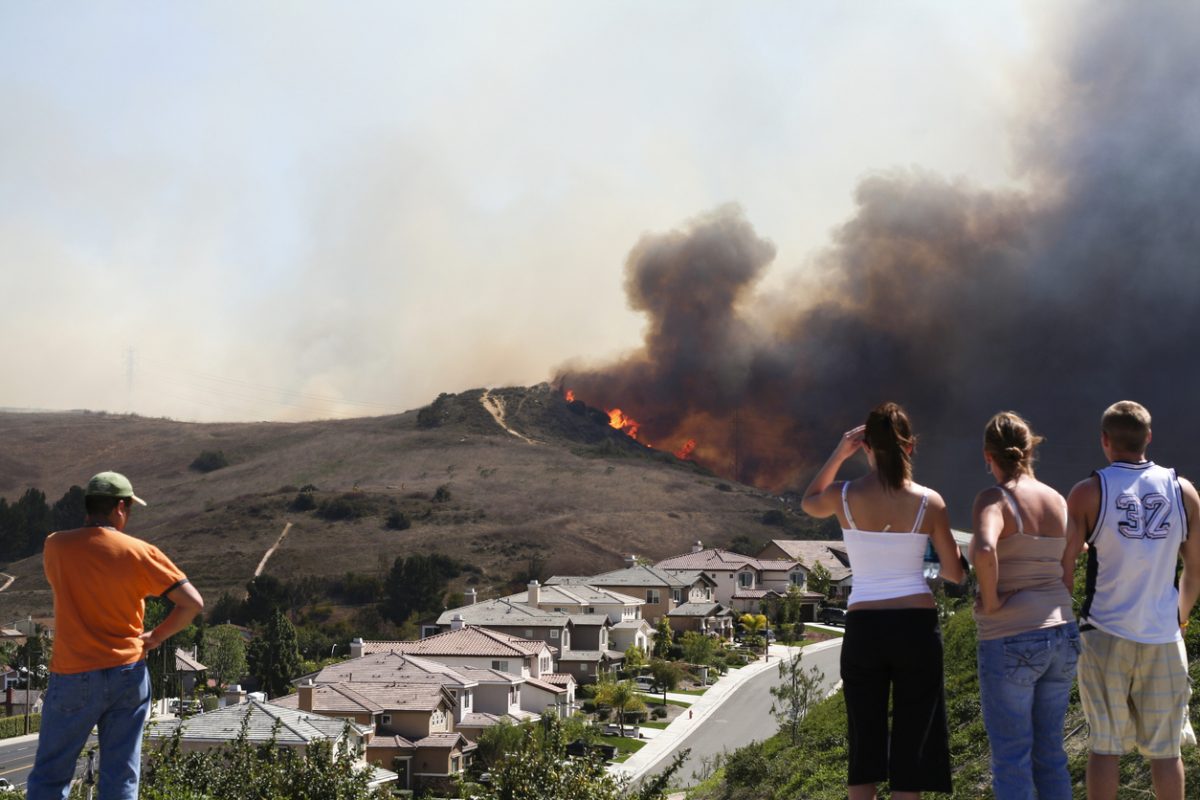
Possible Ethical Issues of Digital Mental Health Education During and After the COVID-19 Pandemic and How to Prevent Them
“I am always ready to learn although I do not always like being taught.”1
There is a great need within the limiting context of the coronavirus disease 2019 (COVID-19) pandemic to resume educational activities. However, they will need to be modified for the foreseeable future following the pandemic, as certain measures such as social distancing will be applied or at least recommended for a long time.2-8
Given the restrictions almost uniformly mandated across different nations and educational systems and levels, digitalization seems to be an obvious choice, and various parts of the medical school curriculum have already been “uploaded and shared.” However, digitalization comes with inherent limitations, as especially during clinical subjects and rotations it seems necessary at some point to expose trainees to living individuals seeking help for various illnesses and health problems.9,10 Such an exposure, with that word carrying important connotations in the time of pandemics, despite all possible risks is necessary since arguably most important aspects of medicine cannot be learned otherwise.9 Additionally, encounters with patients during medical education might be some of the most important formative experiences for future physicians, necessary for development of a genuine ego-syntonic professional identity—ready to think, act, and feel as a physician.9,10 During the COVID-19 pandemic, and given its postulated importance for professional and ethical development, contact with patients might possibly be even more vital for future physicians (and indeed health care workers in general). Isolating them from the clinical context at such a time, and for prolonged periods, might create not only educational gaps but also unwanted dissociations (or at best lags) in the nascent professional identity, as well as serious disruptions of learning trajectories.11,12 Additionally, disruption of the medical education system in the context of the COVID-19 pandemic may cause significant stress to students, making them vulnerable to various physical and mental health disturbances.12 In mental health and psychiatry, such privileged encounters may be particularly necessary, as they allow students to experience authentic psychopathology and develop critical clinical skills in the direct contact and clinical context, while sensitizing them to mental health-related issues.3,5,6,8,13,14 This may be particularly important currently, as the pandemic setting may contribute to the worsening of mental health—to a similar extent in those with prior mental health disorders and in previously unaffected populations—with unpredictable presentations and dynamics.15-18 The same is true not only during the pandemic but also in the post-pandemic, recovery-oriented reality that awaits us as well. Nonetheless, educational activities that include patients are universally important across medical specialties and specific educational programs.
Despite that such an educational gap calls for an immediate (re)action, there should be no room for lowering educational and ethical standards or for challenging previously well-established learning objectives.19 In other words, in the educational setting, similarly as in a clinical one, the patients’ safety and well-being should be of primary importance. One needs not be particularly insightful to foresee many possible ethical issues when, leaving all other issues aside (eg, organizational, technical), trying to present a patient with mental health disorders in such a digital setting.14 The weighing of risks and benefits of such encounters should be thoroughly discussed before engaging in such educational activities. That is even truer when the imperative of acting quickly in the best interest of our students potentially clouds many of our judgments. The need to apply certain standards when approaching especially vulnerable individuals in such an educational context may seem more obvious. However, let us not forget that every patient is vulnerable, and, therefore, these standards (or at least underlying principles) should be used in most digital patient encounters occurring within the medical education system. To minimize risk from such encounters, certain considerations should be taken into account (Box 1).
In conclusion, specific and intense major external pressures can force changes in all aspects of our lives and functioning, including the educational process, leaving us with the imperative of overcoming imposed limitations quickly, with digitalization of teaching seeming like the low-hanging fruit in the process.3,4,14 Despite that such context requires flexibility and creativity when trying to nurture educational continuity and quality, future medical education may benefit, as adoption of such methods may facilitate transformation from more traditional, didactic-based learning to more individualized, adaptive learning with the possibilities of providing guidance and multisource feedback and evaluation while fostering students’ self-learning.3,5,13,19 However, while some things can only be learned in direct (even if digital) contact with real patients, and while that contact might be a vital part of developing a coherent professional identity, one should be mindful of all the pitfalls of such an approach and employ a clear set of standards and principles (of which we outlined a few). And, finally, if considering the development of mature professional identities of future physicians and mental health professionals, we should also immediately start asking the question of when such a digital approach reaches its limits. When we get to those limits, mindful of all the risks and employing extra epidemiologic safety measures, we will be forced to accept that, at some point, the place of medical students might be next to the bedside of those we are teaching them to care for.
Received: September 18, 2020.
Published online: December 31, 2020.
Author contributions: Dr Curkovic provided the initial idea and drafted the initial version of the manuscript. Drs Curkovic, Savic, and Brecic edited, reviewed, and prepared the manuscript for submission. All of the authors contributed to and approved the final version of the manuscript.
Potential conflicts of interest: Dr Curkovic has received lecture honoraria from Lundbeck, Johnson & Johnson, Sandoz, Pliva (Teva), and Alkaloid. Dr Savic has received lecture honoraria from Lundbeck, Johnson & Johnson, Pliva (Teva), Alkaloid, Mylan, Krka, and Makpharm. Dr Brecic has received lecture honoraria from Lundbeck, Johnson & Johnson, Pliva (Teva), and Alkaloid.
REFERENCES
1.50 Sir Winston Churchill Quotes to Live By. Anglophenia. BBC America [internet]. https://www.bbcamerica.com/blogs/50-churchill-quotes—49128. Accessed December 17, 2020.
2. Woolliscroft JO. Innovation in response to the COVID-19 pandemic crisis. Acad Med. 2020;95(8):1140-1142. PubMed CrossRef
3. Arbuckle MR, Travis MJ, Eisen J, et al. Transforming psychiatry from the classroom to the clinic: lessons from the National Neuroscience Curriculum Initiative. Acad Psychiatry. 2020;44(1):29-36. PubMed CrossRef
4. Theoret C, Ming X. Our education, our concerns: the impact on medical student education of COVID-19. Med Educ. 2020;54(7):591-592. PubMed CrossRef
5. Wind TR, Rijkeboer M, Andersson G, et al. The COVID-19 pandemic: the ‘ black swan’ for mental health care and a turning point for e-health. Internet Interv. 2020;20:100317. PubMed CrossRef
6. Batchelder E, Piper L, Sarwar S, et al. Psychiatric medical education in the age of COVID-19: the Penn State Health experience. Prim Care Companion CNS Disord. 2020;22(5):20com02773. PubMed CrossRef
7. Jumreornvong O, Yang E, Race J, et al. Telemedicine and medical education in the age of COVID-19. Acad Med. 2020;95(12):1838-1843. PubMed CrossRef
8. Looi JC, Bonner D, Maguire P, et al. Flattening the curve of COVID-19 for medical education in psychiatry and addiction medicine [published online ahead of print August 10, 2020]. Australas Psychiatry. PubMed CrossRef
9. Swanwick T, Forrest K, O’ Brien BC, eds. Understanding Medical Education: Evidence, Theory and Practice. 3rd ed. Hoboken, NJ: Wiley-Blackwell; 2019.
10.Cruess RL, Cruess RS, Steinert Y, eds. Teaching Medical Professionalism: Supporting the Development of a Professional Identity. 1st ed. Cambridge, UK: Cambridge University Press; 2016.
11.Stetson GV, Kryzhanovskaya IV, Lomen-Hoerth C, et al. Professional identity formation in disorienting times. Med Educ. 2020;54(8):765-766. PubMed CrossRef
12.Araújo FJO, de Lima LSA, Cidade PIM, et al. Impact of Sars-Cov-2 and its reverberation in global higher education and mental health. Psychiatry Res. 2020;288:112977. PubMed
13.Sunderji N, Crawford A, Jovanovic M. Telepsychiatry in graduate medical education: a narrative review. Acad Psychiatry. 2015;39(1):55-62. PubMed CrossRef
14.Hilty DM, DeJong S. Putting technologies used for clinical care and education in context. Acad Psychiatry. 2018;42(6):753-758. PubMed CrossRef
15.Brooks SK, Webster RK, Smith LE, et al. The psychological impact of quarantine and how to reduce it: rapid review of the evidence. Lancet. 2020;395(10227):912-920. PubMed CrossRef
16.Kuzman MR, Curkovic M, Wasserman D. Principles of mental health care during the COVID-19 pandemic. Eur Psychiatry. 2020;63(1):e45. PubMed CrossRef
17.Marko C, KoÅ¡ec A, Brecic P. Stay home while going out—possible impacts of earthquake co-occurring with COVID-19 pandemic on mental health and vice versa. Brain Behav Immun. 2020;87:82-83. PubMed CrossRef
18.Goldberg JF. Psychiatry’s niche role in the COVID-19 pandemic. J Clin Psychiatry. 2020;81(3):20com13363. PubMed CrossRef
19.Cleland J, Tan ECP, Tham KY, et al. How COVID-19 opened up questions of sociomateriality in healthcare education. Adv Health Sci Educ Theory Pract. 2020;25(2):479-482. PubMed CrossRef
aUniversity Psychiatric Hospital Vrapce, Bolnicka cesta 32, 10 090 Zagreb, Croatia
bSchool of Medicine, University of Zagreb, Salata 2, 10 000 Zagreb, Croatia
*Corresponding author: Marko Curkovic, MD, PhD, University Psychiatric Hospital Vrapce, Bolnicka cesta 32, 10090 Zagreb, Croatia ([email protected]).
Prim Care Companion CNS Disord 2021;23(1):20com02818
To cite: Curkovic M, Savic A, Brecic P. Possible ethical issues of digital mental health education during and after the COVID-19 pandemic and how to prevent them. Prim Care Companion CNS Disord. 2021;23(1):20com02818.
To share: https://doi.org/10.4088/PCC.20com02818
© Copyright 2020 Physicians Postgraduate Press, Inc.
Enjoy this premium PDF as part of your membership benefits!





